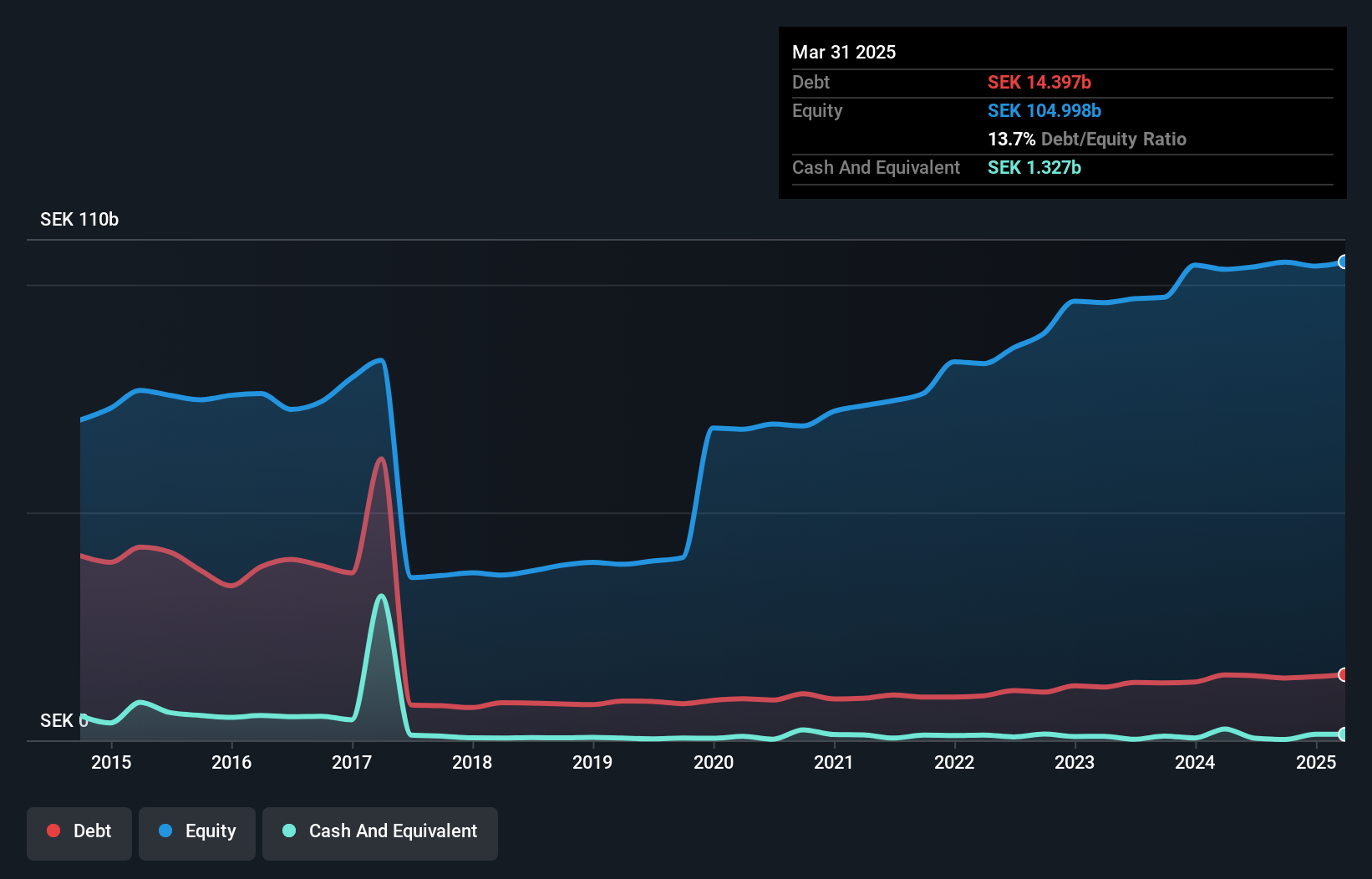- Sweden
- /
- Paper and Forestry Products
- /
- OM:SCA B
We Think Svenska Cellulosa Aktiebolaget (STO:SCA B) Can Stay On Top Of Its Debt

Warren Buffett famously said, 'Volatility is far from synonymous with risk.' So it seems the smart money knows that debt - which is usually involved in bankruptcies - is a very important factor, when you assess how risky a company is. As with many other companies Svenska Cellulosa Aktiebolaget SCA (publ) (STO:SCA B) makes use of debt. But the real question is whether this debt is making the company risky.
What Risk Does Debt Bring?
Debt is a tool to help businesses grow, but if a business is incapable of paying off its lenders, then it exists at their mercy. If things get really bad, the lenders can take control of the business. However, a more usual (but still expensive) situation is where a company must dilute shareholders at a cheap share price simply to get debt under control. Of course, plenty of companies use debt to fund growth, without any negative consequences. When we think about a company's use of debt, we first look at cash and debt together.
What Is Svenska Cellulosa Aktiebolaget's Debt?
As you can see below, Svenska Cellulosa Aktiebolaget had kr14.4b of debt, at March 2025, which is about the same as the year before. You can click the chart for greater detail. However, it also had kr1.33b in cash, and so its net debt is kr13.1b.

How Healthy Is Svenska Cellulosa Aktiebolaget's Balance Sheet?
Zooming in on the latest balance sheet data, we can see that Svenska Cellulosa Aktiebolaget had liabilities of kr7.81b due within 12 months and liabilities of kr37.3b due beyond that. On the other hand, it had cash of kr1.33b and kr4.61b worth of receivables due within a year. So its liabilities outweigh the sum of its cash and (near-term) receivables by kr39.2b.
This deficit isn't so bad because Svenska Cellulosa Aktiebolaget is worth kr91.4b, and thus could probably raise enough capital to shore up its balance sheet, if the need arose. But we definitely want to keep our eyes open to indications that its debt is bringing too much risk.
Check out our latest analysis for Svenska Cellulosa Aktiebolaget
We measure a company's debt load relative to its earnings power by looking at its net debt divided by its earnings before interest, tax, depreciation, and amortization (EBITDA) and by calculating how easily its earnings before interest and tax (EBIT) cover its interest expense (interest cover). This way, we consider both the absolute quantum of the debt, as well as the interest rates paid on it.
With a debt to EBITDA ratio of 2.5, Svenska Cellulosa Aktiebolaget uses debt artfully but responsibly. And the alluring interest cover (EBIT of 7.2 times interest expense) certainly does not do anything to dispel this impression. Importantly, Svenska Cellulosa Aktiebolaget grew its EBIT by 60% over the last twelve months, and that growth will make it easier to handle its debt. The balance sheet is clearly the area to focus on when you are analysing debt. But ultimately the future profitability of the business will decide if Svenska Cellulosa Aktiebolaget can strengthen its balance sheet over time. So if you want to see what the professionals think, you might find this free report on analyst profit forecasts to be interesting.
Finally, a business needs free cash flow to pay off debt; accounting profits just don't cut it. So the logical step is to look at the proportion of that EBIT that is matched by actual free cash flow. Over the last three years, Svenska Cellulosa Aktiebolaget reported free cash flow worth 15% of its EBIT, which is really quite low. That limp level of cash conversion undermines its ability to manage and pay down debt.
Our View
When it comes to the balance sheet, the standout positive for Svenska Cellulosa Aktiebolaget was the fact that it seems able to grow its EBIT confidently. However, our other observations weren't so heartening. For example, its conversion of EBIT to free cash flow makes us a little nervous about its debt. Looking at all this data makes us feel a little cautious about Svenska Cellulosa Aktiebolaget's debt levels. While we appreciate debt can enhance returns on equity, we'd suggest that shareholders keep close watch on its debt levels, lest they increase. The balance sheet is clearly the area to focus on when you are analysing debt. But ultimately, every company can contain risks that exist outside of the balance sheet. We've identified 2 warning signs with Svenska Cellulosa Aktiebolaget , and understanding them should be part of your investment process.
When all is said and done, sometimes its easier to focus on companies that don't even need debt. Readers can access a list of growth stocks with zero net debt 100% free, right now.
New: Manage All Your Stock Portfolios in One Place
We've created the ultimate portfolio companion for stock investors, and it's free.
• Connect an unlimited number of Portfolios and see your total in one currency
• Be alerted to new Warning Signs or Risks via email or mobile
• Track the Fair Value of your stocks
Have feedback on this article? Concerned about the content? Get in touch with us directly. Alternatively, email editorial-team (at) simplywallst.com.
This article by Simply Wall St is general in nature. We provide commentary based on historical data and analyst forecasts only using an unbiased methodology and our articles are not intended to be financial advice. It does not constitute a recommendation to buy or sell any stock, and does not take account of your objectives, or your financial situation. We aim to bring you long-term focused analysis driven by fundamental data. Note that our analysis may not factor in the latest price-sensitive company announcements or qualitative material. Simply Wall St has no position in any stocks mentioned.
About OM:SCA B
Svenska Cellulosa Aktiebolaget
A forest products company, develops, manufactures, and sells forest, wood, pulp, and containerboard products in Sweden, the United States, Germany, the United Kingdom, rest of Europe, Asia, and internationally.
Adequate balance sheet with questionable track record.
Similar Companies
Market Insights
Community Narratives





